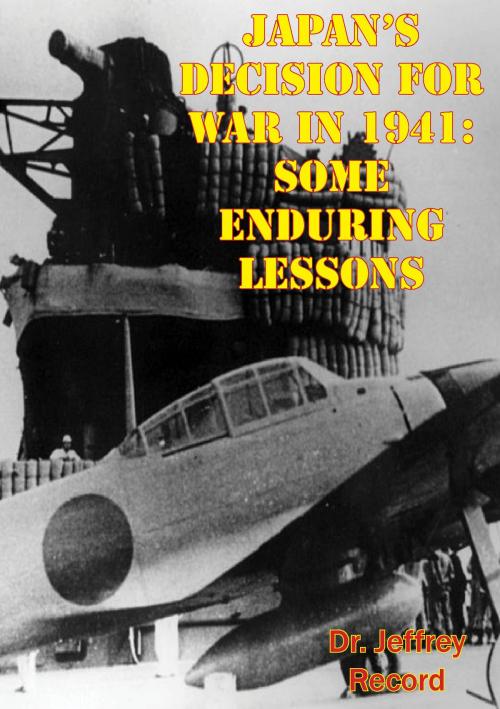Japan’s Decision For War In 1941: Some Enduring Lessons
Nonfiction, History, Germany, European General, Military, United States| Author: | Dr. Jeffrey Record | ISBN: | 9781786252968 |
| Publisher: | Lucknow Books | Publication: | November 6, 2015 |
| Imprint: | Lucknow Books | Language: | English |
| Author: | Dr. Jeffrey Record |
| ISBN: | 9781786252968 |
| Publisher: | Lucknow Books |
| Publication: | November 6, 2015 |
| Imprint: | Lucknow Books |
| Language: | English |
Japan’s decision to attack the United States in 1941 is widely regarded as irrational to the point of suicidal. How could Japan hope to survive a war with, much less defeat, an enemy possessing an invulnerable homeland and an industrial base 10 times that of Japan? The Pacific War was one that Japan was always going to lose, so how does one explain Tokyo’s decision? Did the Japanese recognize the odds against them? Did they have a concept of victory, or at least of avoiding defeat? Or did the Japanese prefer a lost war to an unacceptable peace?
Dr. Jeffrey Record takes a fresh look at Japan’s decision for war, and concludes that it was dictated by Japanese pride and the threatened economic destruction of Japan by the United States. He believes that Japanese aggression in East Asia was the root cause of the Pacific War, but argues that the road to war in 1941 was built on American as well as Japanese miscalculations and that both sides suffered from cultural ignorance and racial arrogance. Record finds that the Americans underestimated the role of fear and honor in Japanese calculations and overestimated the effectiveness of economic sanctions as a deterrent to war, whereas the Japanese underestimated the cohesion and resolve of an aroused American society and overestimated their own martial prowess as a means of defeating U.S. material superiority. He believes that the failure of deterrence was mutual, and that the descent of the United States and Japan into war contains lessons of great and continuing relevance to American foreign policy and defense decision-makers.
Japan’s decision to attack the United States in 1941 is widely regarded as irrational to the point of suicidal. How could Japan hope to survive a war with, much less defeat, an enemy possessing an invulnerable homeland and an industrial base 10 times that of Japan? The Pacific War was one that Japan was always going to lose, so how does one explain Tokyo’s decision? Did the Japanese recognize the odds against them? Did they have a concept of victory, or at least of avoiding defeat? Or did the Japanese prefer a lost war to an unacceptable peace?
Dr. Jeffrey Record takes a fresh look at Japan’s decision for war, and concludes that it was dictated by Japanese pride and the threatened economic destruction of Japan by the United States. He believes that Japanese aggression in East Asia was the root cause of the Pacific War, but argues that the road to war in 1941 was built on American as well as Japanese miscalculations and that both sides suffered from cultural ignorance and racial arrogance. Record finds that the Americans underestimated the role of fear and honor in Japanese calculations and overestimated the effectiveness of economic sanctions as a deterrent to war, whereas the Japanese underestimated the cohesion and resolve of an aroused American society and overestimated their own martial prowess as a means of defeating U.S. material superiority. He believes that the failure of deterrence was mutual, and that the descent of the United States and Japan into war contains lessons of great and continuing relevance to American foreign policy and defense decision-makers.

![Cover of the book The Mediterranean and Middle East: Volume I The Early Successes Against Italy (To May 1941) [Illustrated Edition] by Dr. Jeffrey Record](https://www.kuoky.com/images/2014/august/300x300/9781782895589-Gmiw_300x.jpg)
![Cover of the book The Tiger Triumphs - The Story Of Three Great Divisions In Italy [Illustrated Edition] by Dr. Jeffrey Record](https://www.kuoky.com/images/2014/august/300x300/9781782894742-ngfJ_300x.jpg)







![Cover of the book Adventures In Propaganda; Letters From An Intelligence Officer In France [Illustrated Edition] by Dr. Jeffrey Record](https://www.kuoky.com/images/2013/march/300x300/9781782890652-UHRZ_300x.jpg)
![Cover of the book Forty Days In 1914 [Illustrated Edition] by Dr. Jeffrey Record](https://www.kuoky.com/images/2015/november/300x300/9781786255464-bLEQ_300x.jpg)


![Cover of the book A Volunteer Poilu [Illustrated Edition] by Dr. Jeffrey Record](https://www.kuoky.com/images/2014/august/300x300/9781782893110-8OEc_300x.jpg)
